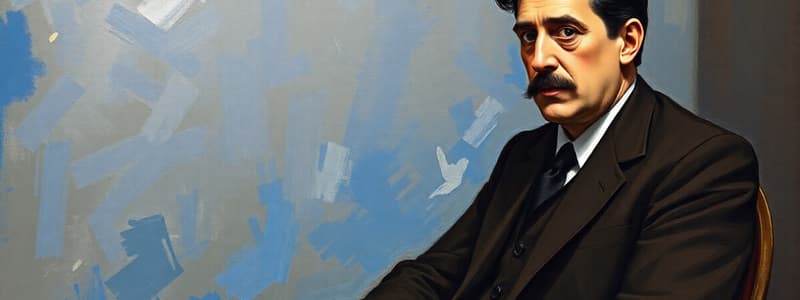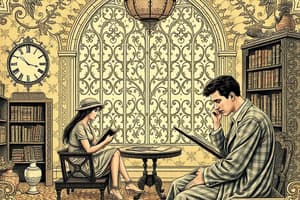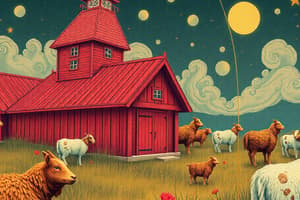Podcast
Questions and Answers
What significant experience influenced Orwell's decision to pursue writing despite initial attempts to abandon it?
What significant experience influenced Orwell's decision to pursue writing despite initial attempts to abandon it?
- His interactions in the political movements
- His father's job in the Civil Service
- His feelings of outrage against his true nature (correct)
- His extensive travels across Europe
Which of the following statements best encapsulates Orwell's view of himself and writers in general?
Which of the following statements best encapsulates Orwell's view of himself and writers in general?
- Writers possess traits like vanity, selfishness, and laziness. (correct)
- Writers should strive to be selfless and diligent.
- Writers are purely motivated by fame and wealth.
- Writers are always politically engaged and active.
What gap in his family dynamics did Orwell experience during his childhood?
What gap in his family dynamics did Orwell experience during his childhood?
- He had a five-year gap with siblings both older and younger. (correct)
- He had a close relationship with both parents.
- He was the youngest of five children.
- He had no siblings and thus felt no loneliness.
Which aspect of Orwell's life is NOT mentioned as contributing to his feelings of loneliness?
Which aspect of Orwell's life is NOT mentioned as contributing to his feelings of loneliness?
Which of the following works is NOT attributed to George Orwell?
Which of the following works is NOT attributed to George Orwell?
Which political stance does Orwell express through his writing?
Which political stance does Orwell express through his writing?
What overarching theme does Orwell address in his essay 'Why I Write'?
What overarching theme does Orwell address in his essay 'Why I Write'?
At what age did Orwell claim to have decided he would become a writer?
At what age did Orwell claim to have decided he would become a writer?
What triggered the author’s literary ambitions during childhood?
What triggered the author’s literary ambitions during childhood?
Which of the following best describes the author's first poem?
Which of the following best describes the author's first poem?
What type of writing did the author predominantly engage in during childhood?
What type of writing did the author predominantly engage in during childhood?
How did the author feel about their writing speed at fourteen?
How did the author feel about their writing speed at fourteen?
What was the nature of the author’s 'made-to-order' writing?
What was the nature of the author’s 'made-to-order' writing?
Which famous poet does the author suggest they may have plagiarized in their first poem?
Which famous poet does the author suggest they may have plagiarized in their first poem?
What kind of story did the author engage in mentally throughout the years?
What kind of story did the author engage in mentally throughout the years?
What was the author's perception of the school magazines they edited?
What was the author's perception of the school magazines they edited?
What describes the primary reason for a writer's aesthetic motive according to the content?
What describes the primary reason for a writer's aesthetic motive according to the content?
Which motive is described as the desire to present true facts for future generations?
Which motive is described as the desire to present true facts for future generations?
How does the author suggest political bias is present in all forms of writing?
How does the author suggest political bias is present in all forms of writing?
What does the author imply about the aesthetic motives of most writers?
What does the author imply about the aesthetic motives of most writers?
What feeling does the author convey about societal realities during their writing process?
What feeling does the author convey about societal realities during their writing process?
What influenced the author to become a pamphleteer?
What influenced the author to become a pamphleteer?
What internal conflict does the author express in the poem referenced?
What internal conflict does the author express in the poem referenced?
In what way does the author view their writing journey in relation to historical events?
In what way does the author view their writing journey in relation to historical events?
What changed in the author's storytelling as he matured from a child?
What changed in the author's storytelling as he matured from a child?
What specific literary quality did the author admire in the works of others?
What specific literary quality did the author admire in the works of others?
What aspect of language did the author discover at the age of sixteen?
What aspect of language did the author discover at the age of sixteen?
What genre of writing did the author aspire to create early on?
What genre of writing did the author aspire to create early on?
What does the author suggest is necessary to understand a writer's motives?
What does the author suggest is necessary to understand a writer's motives?
What was one of the author’s notable works written at the age of thirty?
What was one of the author’s notable works written at the age of thirty?
What element of writing did the author consider essential to his narrative style?
What element of writing did the author consider essential to his narrative style?
How did the author feel about his early writing efforts?
How did the author feel about his early writing efforts?
What is one of the primary challenges the author faces in reconciling his writing?
What is one of the primary challenges the author faces in reconciling his writing?
What did the critic advise the author regarding his book, 'Homage to Catalonia'?
What did the critic advise the author regarding his book, 'Homage to Catalonia'?
In what manner did the author claim he has attempted to write in recent years?
In what manner did the author claim he has attempted to write in recent years?
How did the author feel about the political nature of his writing?
How did the author feel about the political nature of his writing?
What does the author suggest about the relationship between writing style and personal growth?
What does the author suggest about the relationship between writing style and personal growth?
What sentiment does the author express regarding his future works?
What sentiment does the author express regarding his future works?
What is the underlying emotion the author expresses about his writing motivations?
What is the underlying emotion the author expresses about his writing motivations?
What problem does the author face with writing in a politically charged context?
What problem does the author face with writing in a politically charged context?
Flashcards are hidden until you start studying
Study Notes
George Orwell
- George Orwell was the pen name of Eric Blair (1903-1950)
- Orwell was born in the village of Motihari, India, where his father worked for the British Civil Service
- He was the middle child of three, with gaps of five years between each sibling
- He was isolated and unpopular throughout his schooldays
- Orwell enlisted in the Imperial Police in Burma from 1922-1927
- He lived in England, Paris, Spain and elsewhere, writing about a wide range of topics
- He fought in the Spanish Civil War
- He was actively engaged in political movements against totalitarianism
- He is best known for his political satires, Animal Farm (1945) and 1984 (1949)
Orwell’s Motivations for Writing
- Orwell initially aspired to be a writer from a young age, around 5-6 years old
- He tried to abandon writing between the ages of 17-24, but felt he was disobeying his true nature
- He was lonely as a child and developed unpopular mannerisms
- He made up stories and held conversations with imaginary people
- He felt his literary ambitions were connected to feeling isolated and undervalued
- He believed he had a talent with words and the ability to face unpleasant facts
- He used writing as an outlet for his feelings of failure in everyday life
- When he was eleven, he wrote a patriotic poem which was printed in the local newspaper
- He wrote bad, unfinished "nature poems" in the Georgian style, and attempted a short story (both unsuccessful)
- He wrote a rhyming play in imitation of Aristophanes at the age of fourteen
- While he wrote for school magazines and for specific occasions, he always carried out a ‘literary exercise’ in his mind through a continuous ‘story’ about himself
- He described his surroundings in detail, as if he was writing a descriptive diary in his mind
- He took pleasure in words and their sounds and associations
- He wanted to write naturalistic novels with unhappy endings, filled with details, descriptions, and arresting similes
- He wrote Burmese Days (1934) which exemplified this writing style.
Orwell’s Four Motivations
- Orwell identifies four main reasons people write:
- Aesthetic impulse: Desire for pleasing language and form
- Historical impulse: The desire to record and preserve accurate facts.
- Political purpose: The drive to influence the world, change beliefs and inspire societal change.
- Self-expression: Desire to express personal emotions, thoughts and experiences.
Orwell's Personal Motivations
- He believed he was primarily driven by the aesthetic, historical and self-expression motives.
- He believed he was forced into becoming a 'pamphleteer' because of his experiences.
- His time in Burma, poverty and sense of failure increased his hatred of authority
- He became aware of the working class, and the nature of imperialism
- He believed he was forced into political writing due to events like Hitler's rise to power and the Spanish Civil War
- He wrote a poem expressing his dilemma, the ‘pleasant haven’ of being an ordained clergyman being unattainable because of his lack of religious commitment
Orwell’s Challenges
- Orwell wrestled with the tension between subjective and objective writing
- He struggled to reconcile his personal tastes and impulses with the necessity of objective political writing
- He felt torn between artistic integrity and the need to tell the truth in his book, Homage to Catalonia, about the Spanish Civil War.
- He believed his inclusion of a long chapter about the false accusations against Trotskyists in his book Homage to Catalonia ruined the book. But he felt he could not omit it due to his passion for truth
- He felt it is necessary to evolve and grow beyond any specific writing style he may perfect
- His writing process was about fusing political passion and artistic purpose, beginning with Animal Farm, which he saw as a successful example of this goal
- He felt all books were likely to be failures, but he was clear about the kind of book he wanted to write
Orwell’s Conclusion
- Although his experience with writing appeared to be rooted in public service, he stressed that it was not only about that, but a mix of personal and professional motives.
Studying That Suits You
Use AI to generate personalized quizzes and flashcards to suit your learning preferences.




